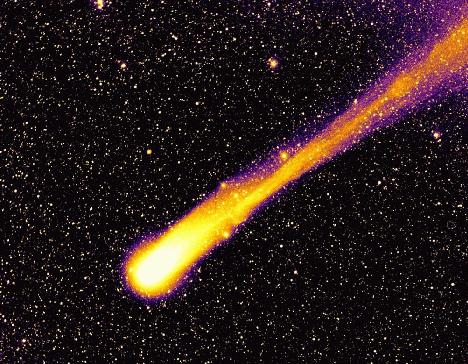![]()

|
![]()
| Date: | 25.3.1996 | Time: | 01:52 UT | Exposure: | 180s |
|---|---|---|---|---|---|
| Field of View: | 17o x 12o | Receiver: | 20482 CCD | Filter: | Schott RG645 |
| Instrument: | f=100mm, 1/2.8 | Observatory: | Hoher List | Observer: | T. Credner, J. Schmoll |
Astronomical Institutes of the University of Bonn
On this false-color image you have a widefield view of comet Hyakutake (17 degrees). It was taken at the 25th of march 1996 at Hoher List Observatory (Vulkaneifel), an observing station of the Sternwarte der Universität Bonn.
The used Schott-Filter enabled us to observe H2O+ in the plasma-tail. With several exposures we have followed the timely changes and movements of the ion condensations. To cover the tail , that was much longer than the field of view, we also have used mosaic technics.
The
DWARF (Deep sensing Wide Angle Recording
Facility).
For the purpose of widefield imaging of cometary tail structures, a
nitrogen cooled CCD-Camera with 2048 x 2048 Pixels was used. It was developed
and buildt by the CCD-Group of the Astronomische Institute Bonn (Klaus
Reif: Vier Millionen Bildelemente, SuW 31, 300 [3/1992]). Sometimes used
for the 1.23m-telescope at Calar Alto, now the imaging optics was a small
f=100mm f/2.0 Zeiss Planar camera lens. With this optics and the 3 x 3
cm2 sized chip a large field of 17 x 17 degrees2 can
be covered. See also the
DWARF page.
This image is already published in: